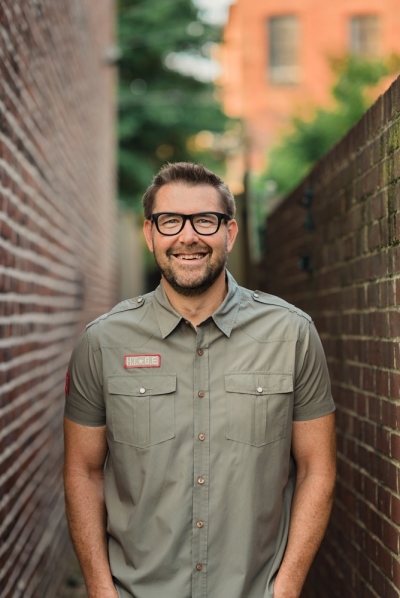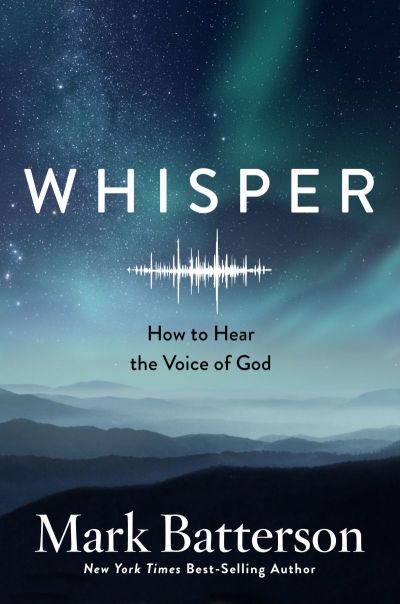Pastor Mark Batterson Describes God's 7 Languages and How to Hear His Voice (Interview)

WASHINGTON — Prominent megachurch Pastor Mark Batterson says many Christians "have hearing problems" when it comes to God's voice and his new book shows them how to tune in and hear God speak to them.
A New York Times best-selling author, Batterson, who leads National Community Church, a multi-site church community with eight locations spread across the metro area, explained how one hears the voice of the Lord, the subject of his latest work, Whisper: How to Hear the Voice of God, in an interview with The Christian Post.
Prayer is a dialogue, Batterson says, yet too often when we pray what we fail to do is listen. And if you never stop to listen you are certainly not going to hear His voice and thereby able to discern His will. For the Christian, nothing is more important than this, he stresses.
The first and foremost language of God is the Scripture, Batterson writes in Chapter 5; the Bible is "the key of keys" to hearing Him. But he is quick to caution against the impulse of "bibliolatry" because God speaks in seven love languages, including Scripture.
"I think there are people, well-meaning people, who believe that God only speaks through Scripture, but they are really undermining Scripture because in Scripture God speaks through desires, doors, dreams, people, promptings and pain," Batterson told CP, naming the other six love languages.
Whisper contains chapters where he unpacks each one of those languages, demonstrating how they occur in the biblical narrative and in the lives of Christians throughout history and in his own life.
"[Jesus] is the same yesterday, today, and forever," he notes, referencing Hebrews 13:8, but when people assert that the sole manner God speaks is through the text, what they end up doing is handcuffing Him. In the minds of many a gap exists between the biblical characters and us. But the closing of the canon of Scripture, however, does not mean He does not still speak today like He did then, though when He does speak it is never in contradiction to His revealed Word.

"You can call me a simpleton, but I believe that if we do what they did in the Bible, God's going to do what He did. He is still the God of miracles, He is still the God who speaks in the same way, His voice is not on mute. The only question is: Are we listening?" Batterson said.
To further underscore this point the author retells in Whisper a fascinating story involving Alfred A. Tomatis. Tomatis was an acclaimed otolaryngologist who was visited by an opera singer who had a mysterious condition. This singer was no longer able to sing a particular note even though he previously could and it was in his octave. Other specialists had thought it was a vocal problem but Tomatis had a different hunch. He used a sonometer to measure his patient's voice and realized that the musician was singing at 140 decibels, a level louder than a military jet.
The opera singer had been deafened by the sound of his own voice. Tomatis discovered that if you cannot hear a note, you cannot sing the note. The voice can only reproduce what the ear can hear. The French Academy of Music now calls this "The Tomatis Effect."
"We think we have relational problems, emotional problems, spiritual problems," in relating to God, Batterson said. "No, we have hearing problems. His voice is joy, His voice is healing, His voice is power, His voice is wisdom. His voice is everything you need."
When people learn to tune into that Voice, it begins to resolve thousands of human problems in the deafening swirl of negative self-talk, critical voices, distractions in culture, and the condemning voice of the devil. But to hear God's voice, getting a revelation of His character and his radical love for people is essential.
On July 2, 2016, Batterson kicked off a teaching series called "Mountains, move" wherein he challenged his church to stop talking to God about the mountains that obstruct life and instead talk to the mountains about God, declaring who He is to those obstacles. He recounts that he felt stirred to challenge his church to pray "the bravest prayer," the prayer that you have prayed 100 times that God has not answered the way you want.
For Batterson his prayer was that God would heal his asthma, which, until recently, he had dealt with all his life. His first asthma attack occurred during the middle of the night when he was 3 or 4 years old. Epinephrine shots and emergency room visits were regular occurrences. He has spent months in intensive care and has been "code blue" at times due to this illness. The hardest thing for him to imagine was for him to believe that God would heal his asthma.
But he started talking to his asthma, his mountain, about God and his goodness. And the asthma mountain moved.
"There weren't 40 days in 40 years that I didn't take my inhaler," Batterson recalled.
"But that was 474 days ago from today," he said in the interview with a huge smile. "I haven't touched an inhaler."
To celebrate he did something he never thought he could do. He ran the Chicago marathon on Oct. 8. The question he always gets, he says, is: "Why do you think it took 40 years?"
"I'll be honest. It's past my pay grade to figure that out," Batterson said, stressing that he wants readers of Whisper to resist the impulse to put deadlines on God and trust His timing.
"Sometimes it's 40 days, sometimes it's 40 years, but at the end of the day, He is the one who calls the shots."
Christians want to figure God out, and He does not fit into the logical constraints of the left brain, he went on to explain, "and I think that God works in strange and mysterious ways in part because it's his way of saying 'You're not going to box me in.'"
Such is the adventure of learning to listen to those whispers, and it takes time to learn.
"Part of the problem is that God has been represented by so many people in ways that misrepresent who He really is. To those who have been on the wrong side of that situation, I'm so sorry. Please hear me: the seven love languages are love languages," the author writes in the book's final chapter.
American society does not practice love and truth, and wrongly defines those terms, he maintains.
"We think love is toleration, and it's not. We live in a culture where it's wrong to say something is wrong. I think that's wrong. Yet at the same time I want to be more known for what we are for than what we are against."
CP asked Batterson how Christians should engage dreams and promptings, and other languages about which he writes to make sure that it's indeed God who is speaking, and not the bad pizza they ate the night before, which seems to be the default assumption of many Western believers.
"My wife and I have been married 25 years. I know her voice. I know her tone of voice. I know her non-verbal voice," he replied. "There is no shortcut to relationship."
The same holds true with God, he said, citing the words of Jesus in John 10:27: "My sheep know my voice."
"Over time, as you grow in relationship with God, you learn to discern the nuances of this voice. And usually God speaks in multiple languages."
"You may have a desire that you think is from God, and you'd better be able to differentiate between a selfish, sinful desire and a desire that is actually because you are delighting yourself in the Lord," Batterson noted, paraphrasing Psalm 37:4.
If the desire is from God, He will confirm it with Scripture, he added, and other times He will confirm it with an open door, or maybe a closed door. The author urges every Christian to heed the advice of author C.S. Lewis who once said: "Let God be as original with others as He was with you."
"In other words, we all have a unique personality, God's going to work through each personality in a way that is a little different," Batterson offered.
"Too often we put so much pressure on 'getting it right' we never even step into the batter's box or even experience the spiritual gifts because we're afraid of them, we're afraid of making a mistake," he said.
Whisper is an invitation for Christians to return to a spiritual Kindergarten grounded in a biblical framework where readers can learn about these things without fear, to not only learn how to hear and discern God's voice but to make sure His is the loudest voice in the room.
"When we learn to get on God's wavelength, hear his voice, then we can sing his song and life becomes in tune and on pitch," Batterson said.
"And it's a pretty beautiful symphony."





















